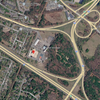Stuyvesant Plaza is claiming squatter’s rights on ‘small parcel’
GUILDERLAND — Stuyvesant Plaza is suing the heirs of a landowner who sold land to the shopping center decades ago, claiming he inadvertently omitted a piece of the parcel in the transaction.
In 1956, Harry Simmons purchased two parcels of land from the McKown Farm Realty Corporation. Two years later, he sold 6.4 acres to Stuyvesant Plaza Inc.
The outdoor plaza, on Route 20 in Guilderland, opened in 1959.
In 1964, Simmons sold another two-and-a-third acres to the plaza.
But Simmons “inadvertently omitted a small parcel of land from the conveyances to Stuyvesant Plaza,” which is identified on tax maps as parcel number 52.04-2-2, but doesn’t actually appear on any tax maps.
Guilderland does not separately assess what the suit calls the “omitted parcel,” which has since been developed into commercial space and parking, according to a Jan. 3 lawsuit filed by Stuyvesant Plaza, Inc.
The plaza itself surrounds the parcel, the filing states, and does not specify where the omitted parcel is located.
Stuyvesant Plaza, the court filing states, “has openly used, maintained, developed, and paid taxes” on the parcel since the sale.
Simmons died in 1984. His wife died the year prior. Both his sons are also deceased. Simmons’s grandchildren, who are the named defendants in the lawsuit and live in the western part of the country, could not be reached for comment.
Stuyvesant Plaza is claiming squatter’s rights on the parcel.
The plaza is seeking a judgment in its favor that it is the rightful owner of the land, and wants to bar Simmons’s heirs from all claims on the omitted parcel; the plaza is also seeking damages of no less than $50,000.



